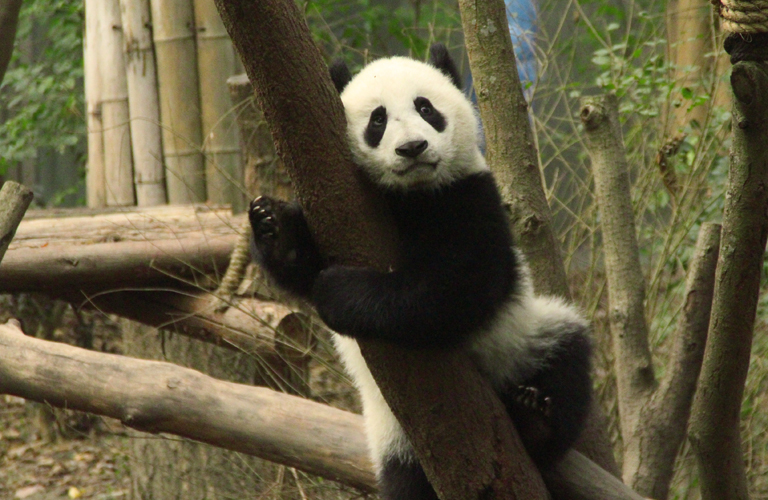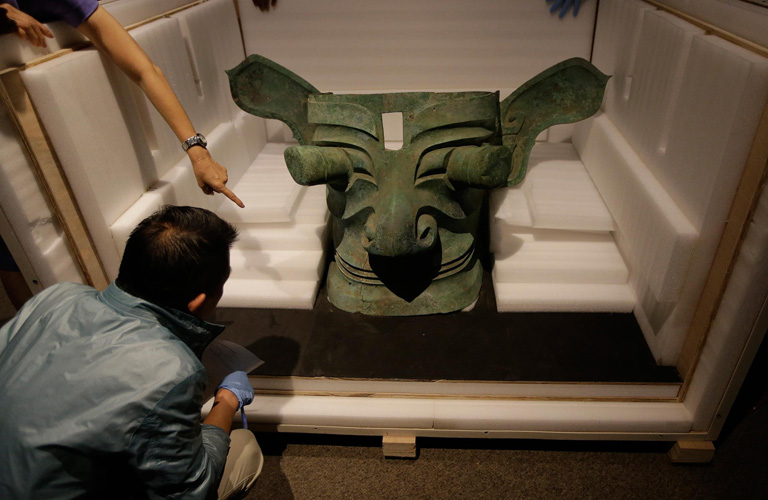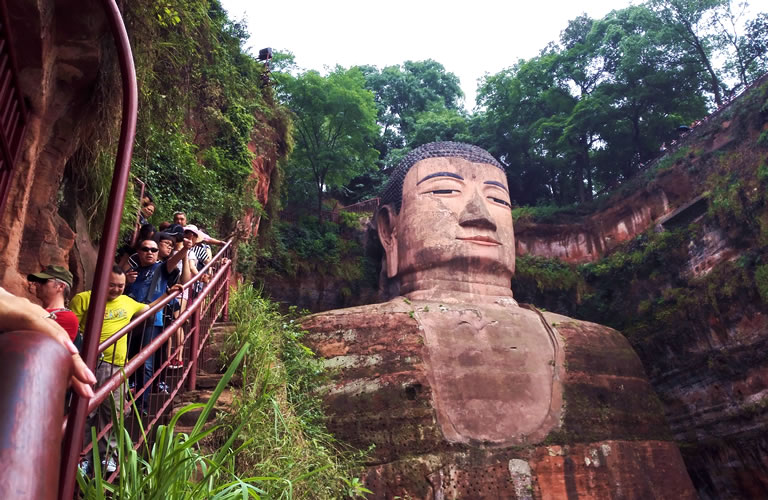Chengdu
Pandas' Hometown
Jiuzhaigou
Famous Fairyland
Emeishan
Sacred Buddhist Site
Leshan
Giant Buddha
Gonggashan
Best for Hiking
Daocheng Yading
Shangri La Views
Dujiangyan
Irrigation System
Siguniangshan
Eastern Alps
updated on August 14, 2016
Chengdu has plenty to offer visitors who want to bring back souvenirs to their family and friends. Sichuanese tea, for example, is quite famous in China and can be bought in small tea shops scattered through the city; other traditional Chinese gifts such as brocade are also among the favorites with tourists, as well as bamboo crafts, spicy snacks and anything related to the national treasure, the panda. As in any large Chinese city, Chengdu features a combination of big shopping malls, luxury boutique stores and commercial pedestrian streets where most any kind of clothing and accessories can be purchased.
Opening Hours -Markets are usually open daily from 7am or 8am to about 6pm. Mall hours are generally 10am-10pm every day. Individual stores open from 10am-9pm each day; privately owned boutiques may not open until 11am, and state-run business may stay open until 10pm, usually in the summer. On weekends the stores are usually the most crowed, especially on Sundays.
Public Conveniences – Shopping malls and department stores have fairly well-maintained public toilets.
In China, haggling is pretty much expected, except in supermarkets and state-run stores. But be forewarned, the Chinese are masters at negotiating. It’s a good idea to have a sense of humour, be patient and keep smiling. Except for certain products like electronics, don’t hesitate to bargain for discounts off the suggested retail price. You may be able to secure as much as 30 to 50 percent off an item, but don’t wrangle over small accounts. To get an idea of the final prices charged, observe the transactions around you and how much currency changes hand. Deal with only one vendor at a time, ideally when no one else is around.
Small shops do not, as a rule, provide shipping services. You will have to use the Chinese postal service, which is generally very reliable. However, in Chengdu and other large cities, antiques shops and furniture stores should be able to ship you bulkiest purchases by air cargo(fast) or by container (slower, but less expensive).
Generally speaking, your airplane ticket gives you the right to send your bulky luggage (more than 44lbs) by freight with the help of a supplemental air carrier such as Air France Cargo liner (www.af-klm.com) or Air China Cargo (www.airchinacargo.com). You must deposit this luggage, clearly labelled with sender and recipient, in a designated hangar close to the airport 2~3 days before departure.
Traditional Sichuanese mementos can be edible souvenirs such as snacks and food products like ding ding candy. Among Sichuanese snacks, the most famous is Zhangfei beef (????), which is beef meat stewed with a dozen seasonings and well packaged for travel. As ti has a black surface and red inside, it is named after the hero in the Three Kingdom Period, who has a dark complexion in the legend. In addition, there are plenty of handcrafted goods, like Sichuan brocade or double-sided embroidery, as well as Chinese opera masks and make-up. All of them can be easily found in the renovated ancient streets, such as Jinli and Wide and Narrow Alleys.
Website: www.cdjinli.com
Address: 1b, 231 Wuhou Temple Avenue
Tel: 028-66311313
This narrow, winding street, 550m long, is bordered by an array of stores in Ming and Qing Dynasty style architecture. Jinli was built as a part of the Wuhou Shrine. You can find every traditional souvenir here, including odds and ends in shape of giant pandas and with opera facial make-up designs, and handcrafts of Sichuan brocade with double-sided embroidery. All types of Chengdu snacks are available here. In the evening, Jinli is animated with crowds at various bars and cafes.
Address: Kuanzhai Xiangzi, between Tongren Road and Changsun Street
Located in the center of Chengdu, near People’s Park, Baihuatan Park and Culture Park, this shopping area is composed of three parallel alleys: Kuan Alley (Wide Alley), Zhai Alley (Narrow Alley) and Jing Alley. It is also a melting pot of restaurants serving various cuisines as well as souvenirs stores with Sichuan items. Several stores sell handcrafts made with Sichuan double-sided embroidery, an art that dates back to the Han Dynasty (206BC-220AD). You can find portable stalls on the streets that sell locally made liquor and folk paintings.
Address: 20-1, Jing Xiangzi
Between Kuan Alley and Zhai Alley, on Jing Alley, you can’t miss this Panda-themed shop with its big bow windows filled with plush panda toys. Everything here is emblazoned with picture of pandas: bowls, toothbrush holders, puppets, pencil cases, key-holders, backpacks, clothing, etc. As a tribute to China’s national treasure, the Panda House is definitely a must-visit if you need to bring back small (or bigger) gifts for children.
Address: 26-1, Kuan Alley
Tel: 028-86259600
Website: www.jiongbox.com
The city-brand store already has several branches locations in Chengdu. JiongBox sells a little bit of everything, many locally designed small objects. Funny and creative postcards can be found here, but also many other items like local soaps and different kinds of teas in pretty boxes. Many of the goods here are of Sichuanese origin, such as traditionally cut paper, future god figurines, and metal bookmarks adorned with Sanxingdui’s masks. You are sure to find a souvenir of two here.
Address: Jinsha Site Museum, No 2 Jinsha Yizhi Road
Tel: 028-87303522
Website: www.jinshasitemusuem.com
If you are interested in souvenirs such as replicas of Jinsha totems or trinkets from the Bronze Age, you can visit three museums stores located within the Jinsha Site Museum. Many gifts for sale are exquisitely designed, high-priced, good-quality merchandise such as writing pens, notebooks, stationary, jewellery and watches.
As a major gateway to Tibet to its west, Chengdu has a significant Tibetan population. Many Tibetan shops can be found in a two-block streth in the vicinity of Wuhou Temple, and Tibetan trinkets can be purchased from sidewalk vendors near the Lotus Market . The “Roof of the World” is famous for its ethnic jewellery of turquoise and silver, Buddhist accessories, colorful fabrics with Tibetan designs and handmade yak-wool rugs. Monks’ attire (red robes to prayer beads), authentic thangkas (the traditional Tibetan paintings of gods), silk sashes, CDs of Tibetan music and even small musical instruments make unique souvenirs.
Digital Square (Computer Market)
(Intersection of First Ring Road and Renmin South Road; Open daily 10am-6pm
It is not recommended that you go to Digital Square Computer Market with any knowledge of the price of electronic goods in your home country or even without knowing how to tell the difference between fake cheap items and good quality ones at bargain price. However, if you are confident in your electronic knowledge and bargaining skills, this market might be your paradise. Usually, imported name-brand goods carry a high price tag, but their locally produced equivalents are quite inexpensive.
South Taisheng Road (Communication Market)
(South Taisheng Road and San Huaishu Road; Open daily 10am-6pm
Whether you want to try some new phones or search for older types, head to South Taisheng Road. Here you can only shop at the large chain stores like Saige digital square, Xunjie and Taili, but you can also bargain in the small street shops. Large stores normally provide guarantees.

Highlights: Giant Panda, Jilin Old Street...

Highlights: Giant Panda, Sanxingdui Museum

Highlights: Panda Volunteering, Leshan Giant Buddha...